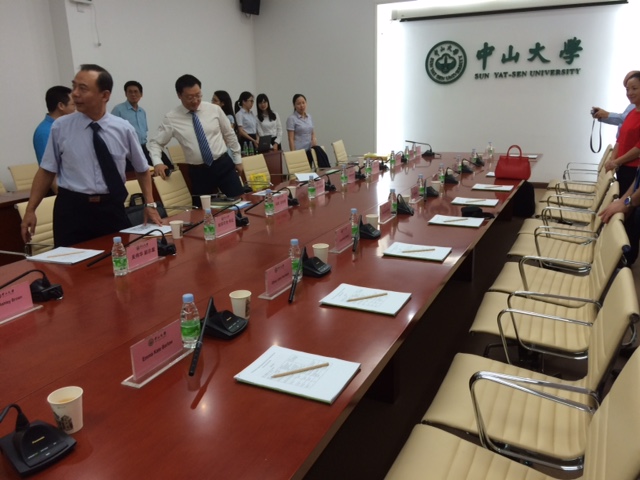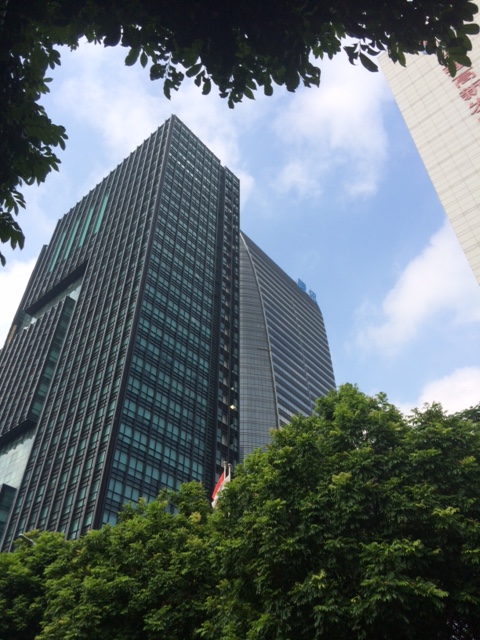Hospitality inspiration from China
With the need to develop strong links with China now a priority for many UK universities, Catering and Conference Manager Bill Brogan recently undertook a fact-finding tour of the country that could see fresh ideas influencing the way the College caters for its overseas visitors.
Building partnerships with other countries and knowing how to cater for overseas students and visitors is high on the agenda in most UK universities.
Currently by far the largest cohort of international students in the UK comes from China: according to the UK Council for International Student Affairs, more than 87,000 Chinese students were studying in the UK in 2013-14, and as the global education market continues its trend of rapid growth, this number is only set to increase.
It is not surprising that UK universities are actively looking at ways to enhance provision for Chinese students, and St John’s is no exception. Yet as one of the larger Colleges in Cambridge, with an international reputation for hosting conferences and events and offering an established Bed and Breakfast facility, a more nuanced approach to catering for a wide variety of consumers is essential.
With this in mind, Catering and Conference Manager Bill Brogan recently organised a collaborative research mission to China, in conjunction with The University Caterers Organisation (TUCO), to gain inspiration from and establish links with a diverse range of institutions, encompassing universities, technology corporations and catering businesses in Beijing, Guangzhou, Shenzhen and Hong Kong.
 Leading a 15-strong delegation of catering professionals from universities across the UK, Bill’s aim was to gain a deeper understanding of the differences between British and Chinese food culture, and how Chinese universities cater for their students and customers, with a view to enhancing the services St John’s offers to all of its overseas visitors.
Leading a 15-strong delegation of catering professionals from universities across the UK, Bill’s aim was to gain a deeper understanding of the differences between British and Chinese food culture, and how Chinese universities cater for their students and customers, with a view to enhancing the services St John’s offers to all of its overseas visitors.
The College is already known as one of the only venues in Cambridge to offer authentic Chinese cuisine, and regularly hosts dinners for Chinese groups from other Cambridge Colleges, as well as conference delegates and business cohorts from China. In part this is due to the personal experience of and enthusiasm for Chinese culture that Bill has brought to the Catering and Conference department, since he first visited China almost a decade ago.
Ensuring this trend continues requires an ongoing, detailed appreciation of the needs and preferences of Chinese consumers. Bill explained that while Chinese visitors to the UK are enthusiastic about many aspects of British culture, their experience of food is often negative. “We asked lots of the people we met on the trip and their view was that British food is the worst on the planet!” he commented. “Actually, British food has really come on in recent years, but we need to work harder to change this perception.”
Part of the problem is that many establishments claiming to offer Chinese food are actually peddling a westernised version which is very far from authentic Chinese dishes. “It’s just like with Indian food in the UK,” explained Bill. “If you go to India you don’t get curry as we know it – you get the spices and the flavours, and it’s fresh, not covered in gloopy sauces.”
Bill was the only member of the TUCO delegation with experience of travelling in China. The majority of the group were unaware of fundamental cultural differences when it comes to food and drink, such as that in China typically all meals are eaten hot, and drinking water is served warm, never chilled.
In addition to increasing the delegates’ knowledge of food and drink preferences, the tour also created opportunities for networking with a variety of Chinese contacts, who according to Bill were generally impressed by the UK caterers’ knowledge of food and coffee in particular.
Visits to five Chinese universities also highlighted differences in service trends between the UK and China. “There’s a lot that the College can learn from the Chinese universities,” Bill commented. “The numbers they are serving are amazing. One university we visited had just served 20,000 breakfasts, and Peking University serves approximately 47,000 lunches each day.” Since he first visited China in 2006, Bill has witnessed a dramatic improvement in food service there. “Every time I go the service is better.”
 The tour also provided new insights into how business is done in China, including a meeting at the British Chamber of Commerce in Beijing. For Bill though, the most eye-opening aspect of the trip was a visit to the Shenzhen offices of Tencent, one of China’s largest internet companies and the creator of the free messaging and calling app ‘We Chat’, which is used by 600 million people at any one time and is a prime example of the way new technologies are revolutionising business communications.
The tour also provided new insights into how business is done in China, including a meeting at the British Chamber of Commerce in Beijing. For Bill though, the most eye-opening aspect of the trip was a visit to the Shenzhen offices of Tencent, one of China’s largest internet companies and the creator of the free messaging and calling app ‘We Chat’, which is used by 600 million people at any one time and is a prime example of the way new technologies are revolutionising business communications.
“I was amazed how cutting-edge it was,” Bill said. “It was like going into a space station. Everyone was using social media to get work done, whether that was ordering supplies, organising people or communicating with groups. It made me think we are about ten years behind in terms of the way we do business over here.”
Likewise, in the universities, Bill found that employees were using social media for managing food orders, paying bills and setting up meetings, and that this made the whole process much more efficient.
Another inspiring visit was to Hong Kong’s award-winning Icon Hotel, a pioneer of green thinking in the hospitality industry and the region. The hotel relies only on natural or LED lighting, operates on a paperless principle (saving 2.39 tonnes of paper, or 40 trees, each year), and has a sustainable approach to food sourcing and production. As well as minimising food waste, the hotel partners with The Food Angel, a charitable program which rescues edible surplus food from different sectors of the food industry and turns it into nutritious hot meals which are then redistributed to serve underprivileged communities in Hong Kong.
The trip demonstrated plenty of ways in which forging stronger links with Chinese universities and businesses could help UK education establishments to reassess their organisational processes and ultimately provide more efficient services, tailored to the needs of a range of visitors.
Bill added that lots of the universities represented on the tour have expressed an interest in making future trips, having had their eyes opened to what goes on in other countries and how much can be learnt from visiting and experiencing the food and business culture overseas first-hand.